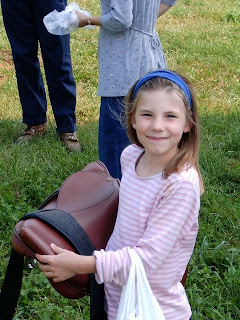
My eldest daughter came to me this morning with teary eyes and the word we've been expecting for several days now--"Cody is dead."

Cody, an American quarterhorse, came to live with us in the fall of 2005. He was the first horse we had ever owned. His working life had been spent out West, cutting cattle, the job for which quarterhorses are bred. His was a hard life before he came to live with us and he literally had the scars to prove it.

I called Cody our "Been There and Done That" horse. He was unflappable and I trusted him. He was the kind of horse who would tolerate children and their rambunctious ways. And he carried literally dozens of children on his back in the years he was with us.


Cody was a good "learner" horse, an animal that my Emily could saddle herself and learn the basics of riding. He would occasionally get grumpy or balky, especially if he hadn't been ridden in a while. But he had been well trained and shown a firm hand he would rise to the occasion.
Of course, he wasn't above a few naughty antics, like the time he ran Emily right under some low-hanging branches in our yard and she was forced to make a hasty dismount.
But he was usually good for a peaceful ride on a summer morning....
...or an exhilarating canter across the field...
But he was old. He had a lot of problems with his teeth. It became more and more difficult for him to eat and every winter he would lose a lot of weight. He was getting uncertain in his footing and last fall Emily took a serious tumble when Cody stumbled and fell. This winter he seemed to be doing fairly well. But four or five days ago Emily came in from chores to say that he was down.
Pneumonia seemed the most likely diagnosis. We started him on penicillin and he did get back up on his feet. But he never recovered. Sometime in the night he lay down and breathed his last.
But even today we keep watch over his pasture companion Star, our Jersey cow, who is due to calf, perhaps today, perhaps tomorrow, but very soon. On a farm new life always follows death.
Cody bore his precious burdens--my children--nobly and well. We have many happy memories of him.

So goodbye, old friend. We will miss you.






